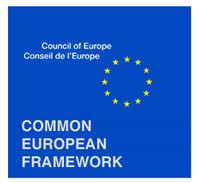LEVELS OF LINGUISTIC COMPETENCES
Here is shown an adaptation of the European Framework for kids. These goals mark the self-assessment criteria of our pupils. A variation of this School European Framework depending on the Science topic is done to facilitate students the comparison of what they learnt and what is asked.
A1
|
I can understand familiar words and very basic phrases concerning myself, my family, and immediate concrete surroundings when people speak slowly and clearly.
|
A2
|
I can understand phrases and the highest frequency vocabulary related to areas of most immediate personal relevance. I can catch the main point in short, clear, simple messages and announcements.
|
B1
|
I can understand the main points of clear standard speech on familiar matters regularly encountered in work, school, leisure, etc. I can understand the main point of many radio or TV programmes on current affairs or topics of personal or professional interest when the delivery is relatively slow and clear.
|
A1
|
I can understand familiar names, words and very simple sentences on: notices, posters or in catalogues.
|
A2
|
I can read very short, simple text. I can find specific, predictable information in simple every day material such as advertisements, prospectuses, menus and timetables. Also letters.
|
B1
|
I can understand texts that consist mainly of high frequency everyday language. I can understand the description of events, feelings and wishes in personal letters.
|
*SPEAKING
A1
|
I can use simple phrases and sentences to describe where I live and people I know
|
A2
|
I can use a series of phrases and sentences to describe in simple terms my family and other people, living conditions, my educational background and my present or more recent job.
|
B1
|
I can connect phrases in a simple way in order to describe experiences and events, my dreams, hopes and ambitions.
I can briefly give reasons and explanations for opinions and plans.
I can narrate a story or relate the plot of a book or film and describe my reactions.
|
A1
|
I can interact in a simple way provided the other person is prepared to repeat or rephrase things at a slower rate of speech and help me formulate what I’m trying to say. I can ask and answer simple questions in areas of immediate need or on very familiar topics.
|
A2
|
I can communicate in simple and routine tasks requiring a simple and direct exchange of information on familiar topics and activities.
I can handle very short social exchanges, even though I can’t usually understand enough to keep the conversation going myself.
|
B1
|
I can deal with most situations likely to arise whilst travelling in an area where the language is spoken. I can enter unprepared into conversation on topics that are familiar, of personal interest or pertinent to everyday life: family, hobbies, work, travel and current events.
|
A1
|
I can write a short, simple postcard, for example sending holidays greetings. I can fill in forms with personal details, for example entering my name, nationality and address on a hotel registration form.
|
A2
|
I can write a short, simple notes and messages. I can write a very simple personal letter, for example talking someone for something.
|
B1
|
I can write simple connected text on topics which are familiar or of personal interest. I can write personal letters describing experiences and impressions.
|
European Framework school + module concretion
Example: SOLAR SYSTEM (A2)
LISTENING:
|
I can understand phrases at the highest frequency vocabulary related
to celestial bodies and the solar system. I can catch the main point in
videos or documentaries about the space.
|
READING:
|
I can read and find specific information about the space in simple
texts. I can understand short messages written on the board, internet or in
activities.
|
SPEAKING:
|
I can use a series of phrases and sentences to describe the celestial
bodies, planets of the solar system, how they work and their descriptions.
|
WRITING:
|
I can write the vocabulary used and sentences to make a speech about
a planet or space mission.
|
ORAL INTERACTION:
|
I can communicate in simple and routine tasks related to outer space,
exchange information and activities. I can handle short exchanges about my
progress even though I can´t usually understand enough to keep the
conversation going myself.
|
This concretion facilitates teachers to create their linguistic objectives and assessment criteria. And it also allows students self-assessment because they are able to identify the goals with they real situation in the classroom and their experiences along the Module.




